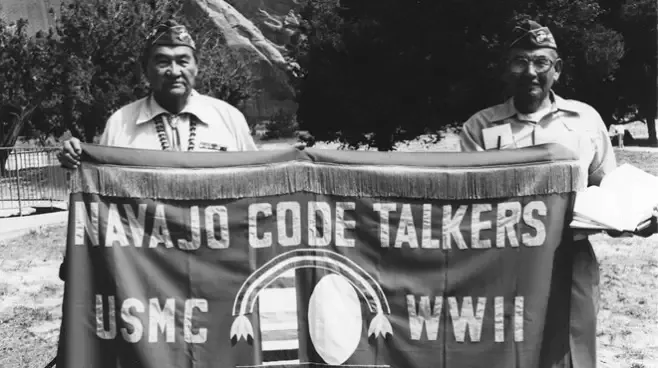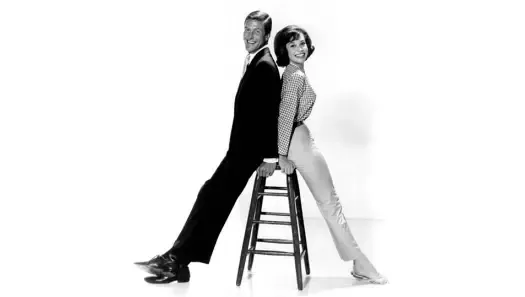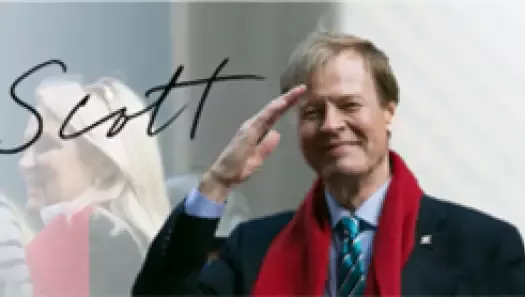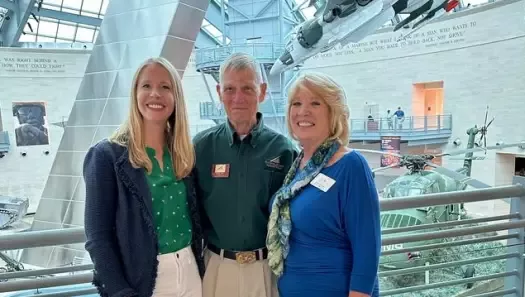HeroVet: Navajo Code Talkers

More than sixty-five years since some of the bloodiest battles in American history, a small group of Veterans who fought in them, our earliest Americans, are finally getting the recognition they deserve.
About 400 Navajo men transmitted secret communications on the battlefields of WWII. At a time when America's best cryptographers were running into difficulties, these Native Americans were making history. They drew upon their proud warrior tradition to brave the dense jungles of Guadalcanal and the exposed beachheads of Iwo Jima to transmit vital communications for the Allied forces. The Navajo Code Talkers' history is both fascinating and impressive. These "Code Talkers" were required to commit over 600 battlefield terms to memory, and they served with distinction in the major engagements of the Pacific theater from 1942-1945.
Recognition has been a long time coming. For more than 20 years after they helped the allies win World War II, the code – considered an invaluable military asset – was classified. The code talkers were not formally honored by the US Government until 2001, nearly 60 years after the code's creation, when they were awarded the Congressional Gold Medal.
Their efforts were immediately popularized in a Navajo Code Talkers movie, "Windtalkers," starring Nicolas Cage and Christian Slater as two Marines assigned to protect Code Talkers in Saipan. Since then, efforts to spread the word continue enthusiastically, with a goal of erecting a special Museum by 2012.
The urgency has been emphasized by the fact that only about 50 of the 400 Code Talkers are believed to be still alive, most living in the Navajo Nation reservation that spans Arizona, New Mexico and Utah. Many are frail or ill, with little time left to tell the world about their wartime contribution.
But on Veterans Day last month, 13 of the Code Talkers, some using canes, a few in wheelchairs, arrived in New York City to participate for the first time in the nation's largest Veterans Day parade, as well as visit as special guests of the Mayor at Grace Mansion. At the invitation of HBO (a Veterans Advantage partner), surviving Navajo Code Talkers rode on a float designed for HBO’s upcoming mini-series "The Pacific," executive produced by Tom Hanks, Steven Spielberg and Gary Goetzman.
"A lot more Marines would be dead right now," if not for the Code Talkers, said New York City Veterans Day parade chairman Patrick Gualtieri. "They truly represent how Americans of all backgrounds have stepped forward throughout our country’s history to defend our freedoms."
The Navajo Code Talkers were also special guests at the parade's opening ceremony, where a wreath was laid at the World War I Eternal Light Monument in Madison Square Park. As the Code Talkers were introduced, the crowd -- which included World War II veteran and actor Tony Curtis -- let out a loud cheer.
"War, although it wasn't good, brought out many unsung heroes who have contributed to this nation," Keith Little said as members of his Code Talkers unit sat behind him. Little, who was a 17-year old Marine on the beaches of Iwo Jima, called the use of the Navajo code "a very unique contribution" to the war effort. It’s a contribution that continues to pay dividends today.
Joseph McKeever, a Navajo and a cadet at the U.S. Military Academy at West Point, received a blessing from his elders during the visit. McKeever says he will try to follow in their footsteps. "They have left a lot of big shoes to fill, and I will try and do my best in my career in the future to represent them in the best way possible," he said.
Image Credit: http://filmcatalog.nmai.si.edu/title/1547/



